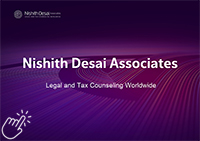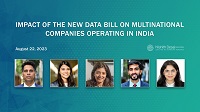Tax Hotline
September 09, 2023
Payment for Broadcast reproduction rights not RoyaltyRecently the Mumbai bench of ITAT1 held that the distribution revenue received by Fox International Channels, which is a resident of United States, is not taxable as royalty under section 9(1)(vi) of the Income Tax Act (“ITA”) or under the US-India Tax treaty. It was held that a “Broadcasting reproduction right” was different from a “Copyright” because the two concepts have been dealt with differently under the Indian Copyright Act, 1957. Facts and BackgroundThe taxpayer had entered into a distribution representation agreement with NGC Network (India) Private Limited (“NGC”). NGC was appointed as taxpayer’s exclusive agent for distribution of the channels to media intermediaries’ subscribers in India. NGC contracted on behalf of the taxpayer with Star India Pvt. Ltd., (“SIPL”) for the distribution of channels. It is important to note that whilst the right to distribute the content was given to SIPL, all intellectual property rights in the content itself remained with the taxpayer. According to the tax authorities consideration paid to the taxpayer by SIPL was tantamount to license fees. Such fees, according to the tax authorities, should fall within the scope of royalty under section 9(1)(vi) of the ITA, and royalties for the purposes of Article 12 of the US-India Tax treaty. Decision and AnalysisRelying on MSM Satellite2 and Set India3 ruling, the tribunal observed that the distribution rights were distinct from a copyright. Therefore, the tribunal held that the payment for such commercial rights could not be characterized as royalties. The taxpayer did not part with any of the copyrights for which the payment can be considered as royalty payment. The tribunal analysed several definitions from the Copyright Act to arrive at this conclusion. Section 14 of the Copyright Act defines copyright to mean exclusive right to do or authorize doing of specific acts. Further, the term “work” is defined in section 2(y) to mean any of the works namely a literary, dramatic, musical, or artistic work or a cinematograph film or a sound recording. Section 14(1) of the Copyright Act lists several acts in respect of a work in relation to which exclusive right would be termed as copyright. In the present case, the taxpayer did not create any literary, dramatic, musical, or artistic work or cinematograph film and/or a sound recording. Importantly, section 37 of the Copyright Act itself defines broadcast reproduction right in contradistinction to copyright. The taxpayer did not transfer any right to use of any copyright and there was a specific restriction imposed on SIPL and the intermediaries from modifying or deleting anything from the transmission of the channel. It was found that the copyright remained with the taxpayer, and that it was not transferred either to NGC or SIPL. Whilst the tribunal’s characterization of income from grant of distribution rights seems accurate, it is interesting that it did not analyse further the question of whether the taxpayer’s business profits were taxable in India. It is clear from the decision that taxpayer’s income in question should be characterized as business income. Article 7 of the US-India tax treaty therefore would be the appropriate distributive rule. Therefore, it must be determined whether the taxpayer had a permanent establishment (“PE”) in India and if any profits were attributable to that PE. It is possible that the taxpayer might have an agency PE in India under Article 5(4) of the tax treaty. Interestingly, the judgment is silent in this respect. Perhaps, the silence may be explained by the prevalent case law in India on attribution of profits to an agency PE. According to the precedence set by the Supreme court in Morgan Stanley, no profits may be attributed to an agency PE once the agent is remunerated at arm’s length. Another possible explanation might be that NGC may be regarded as an agent of an independent status, which could not have constituted a PE in India considering Article 5(5) of the tax treaty.
You can direct your queries or comments to the authors. 1Fox International Channels (US) Inc v. DCIT, ITA NO. 948/MUM/2023 2[2019] 106 taxmann.com 353 (Bombay) 3Income Tax Appeal No.4372 of 2004 Chambers and Partners Asia Pacific 2023: Top Tier for Tax, TMT, Employment, Life Sciences, Dispute Resolution, FinTech Legal Legal 500 Asia Pacific 2023: Top Tier for Tax, TMT, Labour & Employment, Life Sciences & Healthcare, Dispute Resolution Benchmark Litigation Asia Pacific 2023: Top Tier for Tax, Labour & Employment, International Arbitration IFLR1000 2022: Top Tier for M&A and Private Equity AsiaLaw Asia-Pacific 2022: Top Tier for Tax, TMT, Investment Funds, Private Equity, Labour and Employment, Dispute Resolution FT Innovative Lawyers Asia Pacific 2019 Awards: NDA ranked 2nd in the Most Innovative Law Firm category (Asia-Pacific Headquartered) RSG-Financial Times: India’s Most Innovative Law Firm 2019, 2017, 2016, 2015, 2014 DisclaimerThe contents of this hotline should not be construed as legal opinion. View detailed disclaimer. |
|

Recently the Mumbai bench of ITAT1 held that the distribution revenue received by Fox International Channels, which is a resident of United States, is not taxable as royalty under section 9(1)(vi) of the Income Tax Act (“ITA”) or under the US-India Tax treaty. It was held that a “Broadcasting reproduction right” was different from a “Copyright” because the two concepts have been dealt with differently under the Indian Copyright Act, 1957.
Facts and Background
The taxpayer had entered into a distribution representation agreement with NGC Network (India) Private Limited (“NGC”). NGC was appointed as taxpayer’s exclusive agent for distribution of the channels to media intermediaries’ subscribers in India. NGC contracted on behalf of the taxpayer with Star India Pvt. Ltd., (“SIPL”) for the distribution of channels. It is important to note that whilst the right to distribute the content was given to SIPL, all intellectual property rights in the content itself remained with the taxpayer. According to the tax authorities consideration paid to the taxpayer by SIPL was tantamount to license fees. Such fees, according to the tax authorities, should fall within the scope of royalty under section 9(1)(vi) of the ITA, and royalties for the purposes of Article 12 of the US-India Tax treaty.
Decision and Analysis
Relying on MSM Satellite2 and Set India3 ruling, the tribunal observed that the distribution rights were distinct from a copyright. Therefore, the tribunal held that the payment for such commercial rights could not be characterized as royalties. The taxpayer did not part with any of the copyrights for which the payment can be considered as royalty payment.
The tribunal analysed several definitions from the Copyright Act to arrive at this conclusion. Section 14 of the Copyright Act defines copyright to mean exclusive right to do or authorize doing of specific acts. Further, the term “work” is defined in section 2(y) to mean any of the works namely a literary, dramatic, musical, or artistic work or a cinematograph film or a sound recording. Section 14(1) of the Copyright Act lists several acts in respect of a work in relation to which exclusive right would be termed as copyright.
In the present case, the taxpayer did not create any literary, dramatic, musical, or artistic work or cinematograph film and/or a sound recording. Importantly, section 37 of the Copyright Act itself defines broadcast reproduction right in contradistinction to copyright. The taxpayer did not transfer any right to use of any copyright and there was a specific restriction imposed on SIPL and the intermediaries from modifying or deleting anything from the transmission of the channel. It was found that the copyright remained with the taxpayer, and that it was not transferred either to NGC or SIPL.
Whilst the tribunal’s characterization of income from grant of distribution rights seems accurate, it is interesting that it did not analyse further the question of whether the taxpayer’s business profits were taxable in India.
It is clear from the decision that taxpayer’s income in question should be characterized as business income. Article 7 of the US-India tax treaty therefore would be the appropriate distributive rule. Therefore, it must be determined whether the taxpayer had a permanent establishment (“PE”) in India and if any profits were attributable to that PE. It is possible that the taxpayer might have an agency PE in India under Article 5(4) of the tax treaty. Interestingly, the judgment is silent in this respect. Perhaps, the silence may be explained by the prevalent case law in India on attribution of profits to an agency PE. According to the precedence set by the Supreme court in Morgan Stanley, no profits may be attributed to an agency PE once the agent is remunerated at arm’s length. Another possible explanation might be that NGC may be regarded as an agent of an independent status, which could not have constituted a PE in India considering Article 5(5) of the tax treaty.
–
Avani Maheshwari
&
Dr. Dhruv Janssen-Sanghavi
You can direct your queries or comments to the authors.
1Fox International Channels (US) Inc v. DCIT, ITA NO. 948/MUM/2023
2[2019] 106 taxmann.com 353 (Bombay)
3Income Tax Appeal No.4372 of 2004
Disclaimer
The contents of this hotline should not be construed as legal opinion. View detailed disclaimer.
Research Papers
Compendium of Research Papers
Clinical Trials and Biomedical Research in India
Cybersecurity Law and Policy
|
NDA Hotline |



